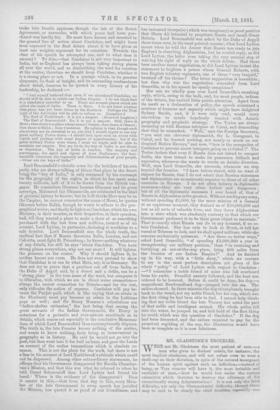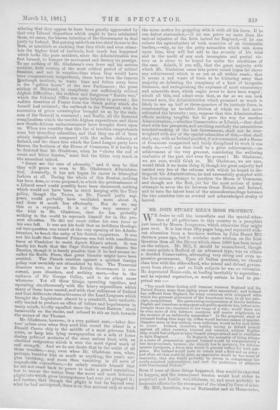MR. GLADSTONE'S TROUBLES.
WERE not Mr. Gladstone the most patient of men,—a man who gives to doctors' orders, for instance, the most implicit obedience, and will not refuse even to wear a skull-cap on their dictation, in spite of the natural insurgence of the human spirit against such an infliction,—instead of being, as Tory rumour will have it, the most irritable and excitable of men,—how he would fret under the various calamities which threaten to destroy the efficiency of his exceptionally strong Administration I It is not only the Irish difficulty, nor only the Obstructionist difficulty, though these may be said to be clearly the chief troubles, especially con-
sidering that they appear to have been greatly aggravated by that very Liberal disposition which ought to have minimised them, we mean, the known intention of the Government to deal justly by Ireland. But putting aside these two chief thorns in the flesh, as raischicfs so rankling that they elicit and even stimu- late the higher kind of fortitude, how much has happened which looks like pure accident, since the Administration was first formed, to hamper its movement and destroy its prestige.
To say nothing of Mr. Gladstone's own fever and his serious accident, both coining at the most critical period of critical Sessions, and not in vacation-time when they would have been comparatively insignificant, there have been the famous Ursidlaugh incident, to waste time and fritter away force in the "golden hours" of the new Parliament ; the great mishap at Maiwand, to complicate our sufficiently critical
Afghan difficulties ; the reckless and dangerous 44 Basuto war," which the Colonial Office was quite helpless to prevent ; the
sudden desertion of France from the Greek policy which she herself had initiated ; the outbreak in the Transvaal, with its succession of grave catastrophes brought, on us by the rash- ness of the General in command ; and finally, all the financial complications which the terrible Afghan expenditure and these new South-African embarrassments have brought down upon us. When you consider that this list of troubles comprehends none but secondary calamities, and that they are all of them utterly insignificant compared with the sullen obduracy of Ireland, and the chaos into which the Land League party have thrown the business of the House of Commons, it is hardly to be doubted that Mr. Gladstone, when he "chews the cud of sweet and bitter fancies," must find the bitter very much in the ascendant indeed.
"Sweet are the uses of adversity," and it may be that they will prove so even to Mr. Gladstone's Administra- tion. Assuredly, it has not begun its career in triumphal fashion at all. During the whole of this Session, nothing has been done, or even proposed, in which the predominance of a Liberal creed could possibly have been discovered, nothing which would not have been in strict keeping with the Tory policy, though the Tories, as Mr. Parnell justly sup- poses, would probably have vacillated more about it, and done it much less effectually. Nor do we say this as a reproach. It is of the very essence of the trial to Mr. Gladstone, that he has probably nothing in the world to reproach himself for in the pre- sent situation. He 'did not court either his own fever or his own fall. It was not his fault that an invidious theologi- cal test-question was raised at the very opening of his Admin- istration, to break the unity of his Scotch supporters. It was not his fault that General Primrose was left with insufficient force at Candahar to resist Ayoub Khan's attack. It was hardly his f ault that the Cape Colonists would disarm the Basutos, though it is barely possible that if he had sooner re- called Sir Bartle Prere, that groat blunder might have been avoided. The French reaction against a spirited foreign poliey was certainly not stimulated by him. The Transvaal disasters were, so far as the British Government is con- cerned, pure disasters, and nothing more,—due to the rashness of Sir George Colley, and to no other cause whatever. Yet all these things, operating together, and operating simultaneously with the heavy expenditure which many of them have caused, and with that sullenness of Ireland and that deliberate obstructiveness of the Land Leaguers which brought the Legislature almost to a standstill, have undoubt- edly tended to produce an effect of failure and hopelessness in many minds, hardly equalled since the 'Great Eastern ' stood immovable on the stocks, and refused to stir an inch towards the waters of the Thames.
Mr. Gladstone, however, is a very patient man,—takes doc- tors' orders even when they send him round the island in a Donald Currie ship in the middle of a most grievous Irish crisis, or keep him lying newspaperless on a sofa at home during political mutinies of the most serious kind, with an obedient resignation which is ever the most signal mark of real strength. And we do not doubt that in the midst of all these troubles,—nay, even when Mr. Gladstone sees, what, perhaps, troubles him as much as anything, the year's sur- plus vanishing, and more than vanishing, in all sorts of unprofitable expenditure,—he calmly reminds himself that he did not come back to power to make a grand reputation, but to rescue. the nation from the worst and most dolorous plight into which gross incompetence had ever yet plunged it ; and further, that though the plight is bad far beyond even what he had anticipated, there is on that account only so much
the more motive for grappling with it with all his force. If he can defeat obstruction,—if he can prove no more than the radical injustice of the Irish hatred for England,—if he can relieve the agriculturists of both countries of an intolerable burden,—why, as for the petty calamities which rain down upon him, they will but add to the severity of his trial and to the merit of any such incomplete and partial vic- tory as is alone to be hoped for under the conditions of the case. Admit, if you will, that the great majority with which Mr. Gladstone came into power raised hopes far above any achievement which is as yet at all within reach ; that it seems a sad waste of force to be frittering away that majority on defeating the conspiracy of a knot of incapable Irishmen, and extinguishing the expenses of most unnecessary and miserable wars, which ought never to have been waged ; admit all this, and admit even that, so far as we can look forward now, the Administration which promised so much is
likely to use up half or three-quarters of its intrinsic force, in counteracting an invisible friction of which we had never
estimated the intensity ;.nay, suppose that this Administration effects nothing tangible but to pave the way for another Administration,—whether Conservative or Liberal,—that shall start with fair prospects, and avoiding carefully the ostentatious mischief-making of the last Government, shall not be over- weighted with any of the special calamities of this,—that shall start, say, with an Ireland pacified, if not contented, and a House of Commons reorganised and fairly disciplined to work it can really do,—will not that itself be a great achievement,—an achievement of the very greatest, considering the weltering confusion of the past, and even the present ? Mr. Gladstone, we are sure, would think so. Mr. Gladstone, ve are sure, would think it no mean thing if, though his great majority had carried very few of the reforms with which he hoped to dis- tinguish his Administration, he had successfully grappled with the first Berious attempt to paralyse the House of Commons, and though not the first, yet far the most serious of many attempts to sever the tie between Groat Britain and Ireland, and to turn the latent heat of the misunderstandings between the two countries into an avowed and acknowledged rivalry of hatred.



































 Previous page
Previous page